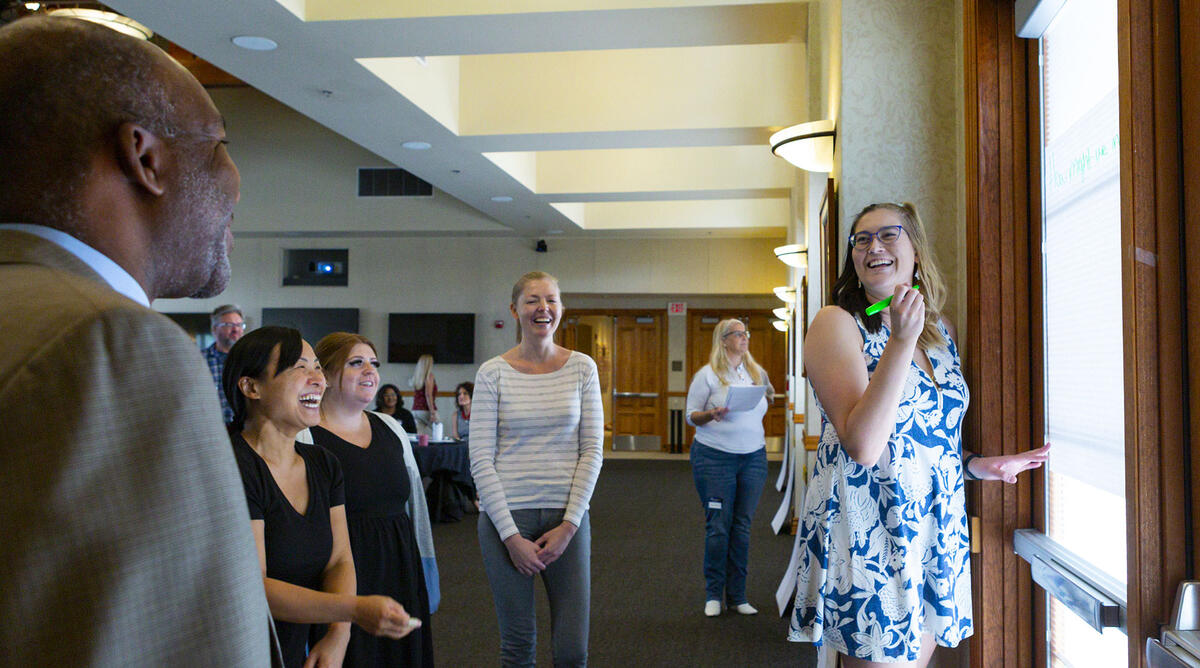
Management Training Academy

UNLV Management Training Academy (MTA) is an nine-week program designed to equip current or aspiring managers with foundational knowledge and skills. This program includes live seminars, interactive time with colleagues, and virtual sessions.
MTA is required prior to participating in the Leadership Experience and the President’s Fellows program.
“Trainers in the MTA are not only subject-matter experts but also dynamic speakers. They employ instructive activities and share real-life examples to keep us engaged and help us strengthen our management skills.”
Tondra De, Chief of Staff, Office of the Executive Vice President and Provost
Employees who spend time at work learning are 23% more ready to take on additional responsibilities, and 21% more likely to feel confident and happy.
Competencies and Courses
UNLV recognizes that effective management directly impacts work quality, productivity, morale, and engagement and is therefore interconnected with the success of the university. MTA contributes to building adaptable leaders who leverage their strengths and address their challenges by focusing on five measurable competencies:
1. Accountability
2. Communication and listening
3. Conflict Resolution
4. Inclusion & Belonging
5. Teamwork
Each course will touch upon one or more of these core competencies.
Join your colleagues for a dynamic training on the four primary functions of a manager, planning, organizing, leading, and controlling. High engagement activities provide impactful experiences that will motivate you to implement new behaviors and better understand your responsibilities to UNLV and your employees.
Trainer: Dr. Mike Smith, Smith Research & Development LLC
Listening Better, Making Difficult Conversations Easier
Communication between supervisors and those they supervise continues to be the most-reported issue on campus. Good communication starts with good listening, and this workshop will share four tips that will help you become a more empathetic listener. By listening more effectively, you will gain a greater understanding of others’ concerns and a new appreciation for their story—which may make your own story more relatable to them.
Even the best work relationships involve difficult conversations—discussions about sensitive subject matter or with very high stakes. It could be a performance evaluation, reorganization, or bad news that must be shared, but these conversations are never easy. That doesn’t, however, mean they have to be awful for either party. Having tackled listening skills, we will then explore—using case studies and interactive role plays—how to make difficult conversations less stressful and more productive.
Trainers: David G. Schwartz, Ph.D., Ombuds, University of Nevada, Las Vegas
Emotional Intelligence
Emotional intelligence is a skill that allows us to read the style of individuals and adjust our communication accordingly. This course will focus on the five core competencies of emotional intelligence: self-management, self-awareness, self-regulation, self-motivation and empathy. Participants will learn to develop and implement these competencies to enhance their relationships in work and life by increasing their understanding of social and emotional behaviors, and learning how to adapt and manage their responses to particular situations.
Trainer: Rhovine Small, MS, Senior Consultant at DRI Consulting
Trainer: Dr. Makesha Spence, Principal Consultant at DRI Consulting and Managing Partner, DRIC Jamaica
Overview of Discrimination and Harassment Concerns
Brainstorm responses to a number of sample scenarios that will help you better understand what to do when someone you supervise or know expresses concerns about discrimination or harassment. You will walk away from this session with a clear list of strategies that contribute to a healthier work environment and campus climate.
Trainer: Michelle Sposito, director, equal employment & Title IX, UNLV
Motivation in the Workplace
What motivates us at work? How does this affect employee engagement? How does employee engagement impact success? The answers may surprise you! Engage in a lively discussion to discover your personal strengths and learn how to use them to motivate your team. You will leave the session with a list of 2-3 self-identified behaviors to help you create a positive, encouraging work environment.
Trainers:
- Lisa Sandoval, leadership development consultant
Corrective Action and Progressive Discipline.
Providing corrective action and discipline to direct reports can be confusing and sometimes scary. Come and learn about the purpose, the responsibilities, and the processes for implementing corrective action and discipline from employee relations experts. Let us help you take the guesswork out of these tricky situations.
Facilitator: Catherine Baker, Interim Employee Relations Director
Resolving Workplace Conflict Skillfully
This interactive workshop will help participants learn their conflict style, better understand the role of conflict styles in exacerbating conflict, and explore strategies and techniques to skillfully resolve work-related conflicts. Interactive elements include group discussions, games, and case studies.
Trainers: David G. Schwartz, Ph.D., Ombuds, University of Nevada, Las Vegas
Coaching for Performance & Feedback
As you have learned in “Management Essentials”, one of the primary responsibilities of a leader is to establish expectations and offer feedback and guidance to their team members. In this session, you will gain knowledge of the various models of feedback, comprehend the crucial components of delivering both positive and negative feedback, and understand the significance of coaching in assisting you when dealing with challenging conversations regarding performance and behavior.
Trainers: Dr. Brenda Thompson-El, Director, Learning & Organizational Development, University of Nevada, Las Vegas

Application Process
The Management Training Academy is currently hosted twice a year. Space is limited.
This opportunity is open to full-time academic faculty, administrative faculty, and classified staff members who currently have direct reports or are aspiring managers. Individuals without direct reports must obtain approval from their supervisor before participating. Priority will be given to applicants with direct reports.
Registration for the next cohort opens four weeks before the end of the semester.
Interested participants are required to fill out the MTA Interest Form and await an email with detailed instructions. Typically, participants can expect to receive an email confirmation within 14 days of submitting the form.
Questions?
For inquires or assistance with the application process, please contact mta@unlv.edu.